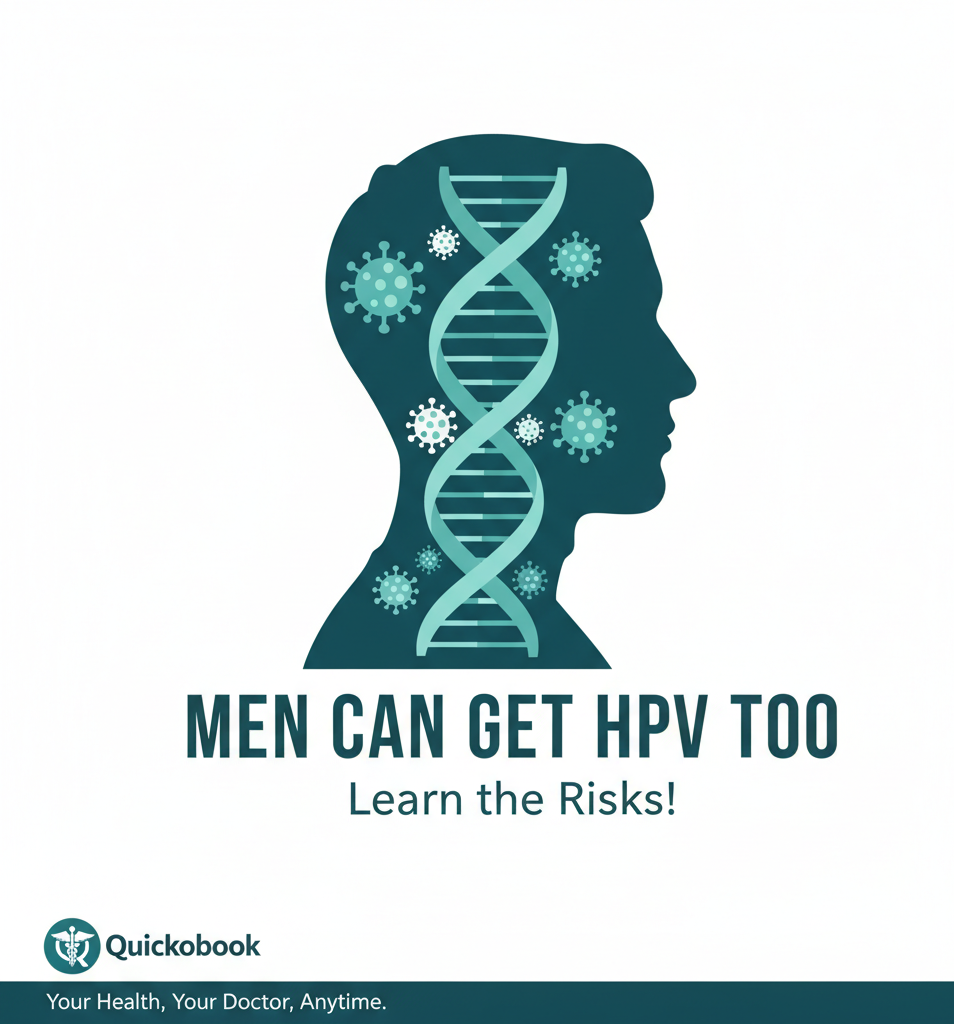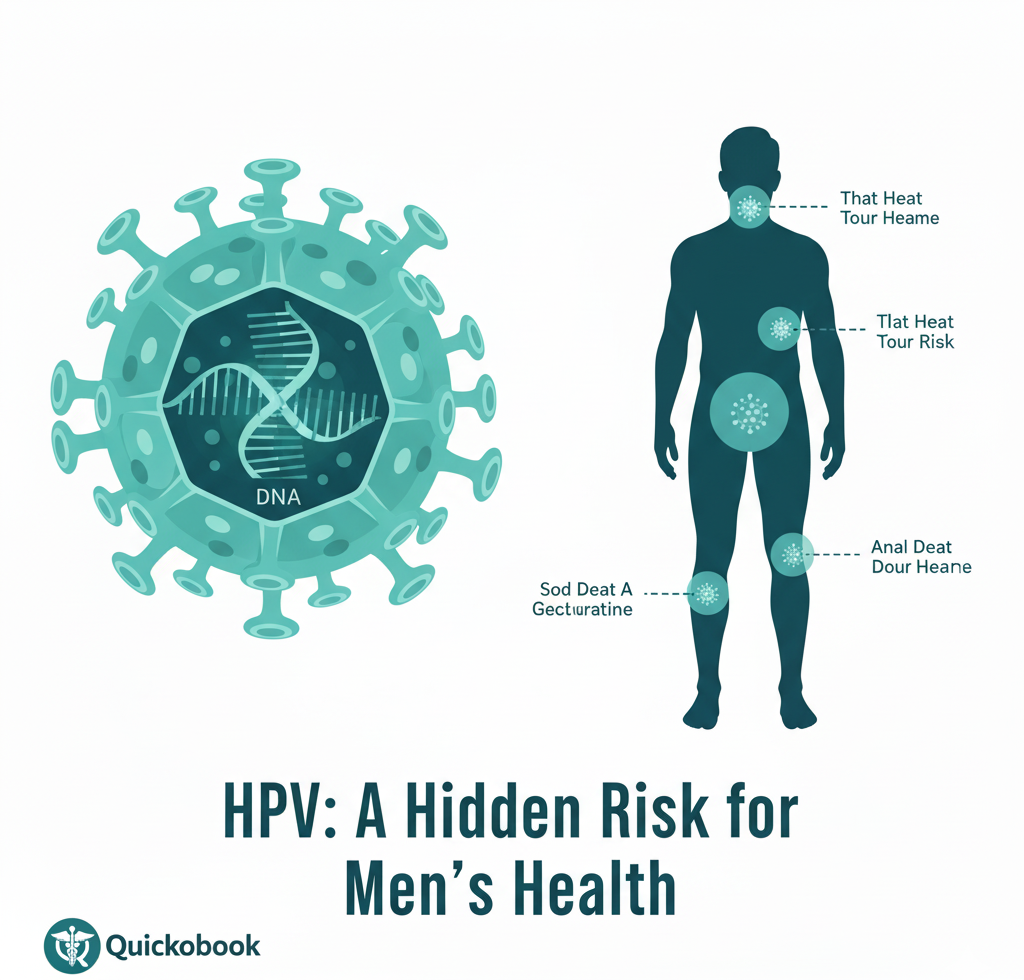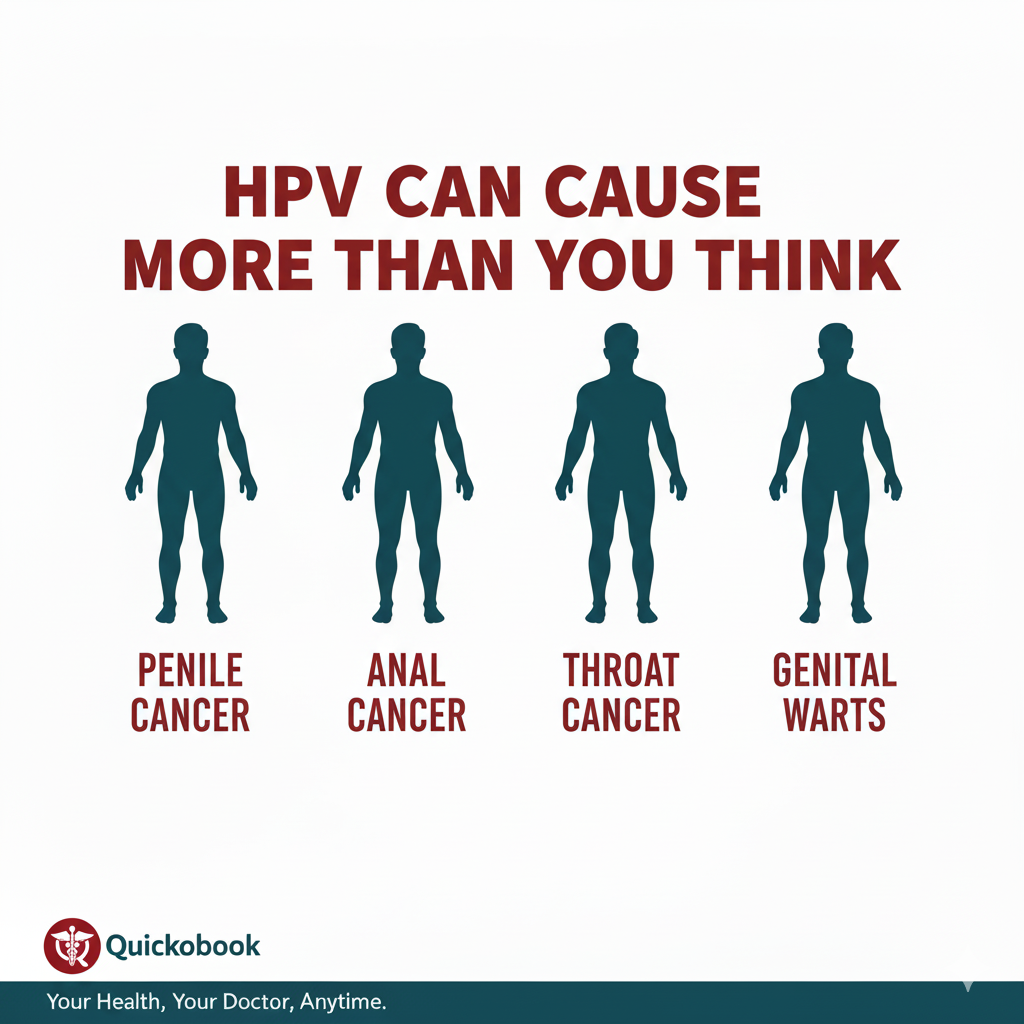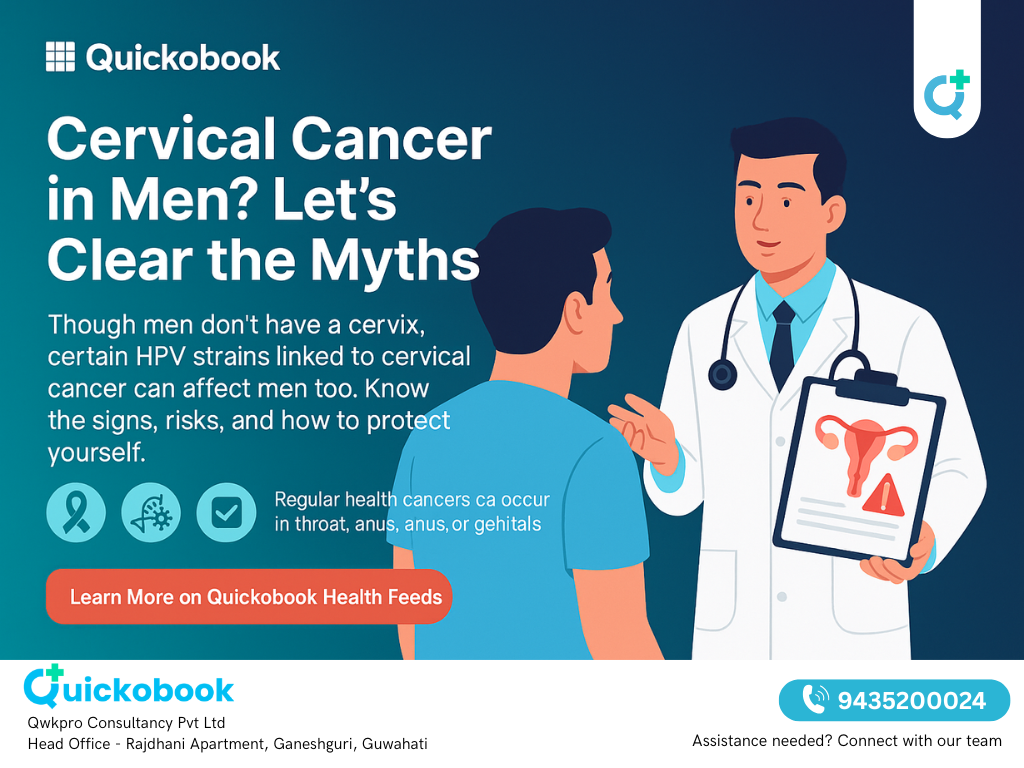Introduction
While cervical cancer is classically known as a disease affecting women, men are not completely out of danger when it comes to HPV (Human Papillomavirus) infections — the leading cause of cervical cancer. HPV doesn’t discriminate by gender. It can also cause anal, penile, and throat cancers in men, especially in those with multiple sexual partners or unprotected sex.
In this blog, an expert oncologist explains how HPV infection puts men at risk, what symptoms to watch for, and how timely vaccination and safe sex practices can prevent complications.

What Is HPV and How It Affects Men?
HPV (Human Papillomavirus) is one of the most common sexually transmitted infections (STIs). Over 100 HPV types exist, and some are high-risk strains responsible for cancer in both men and women.
In men, HPV can infect the:
- Penile skin and shaft
- Anal region
- Mouth and throat
- Scrotal and groin areas
While men do not have a cervix, HPV can still cause “cervical-type” cancers in other genital and mucosal regions.

HPV-Related Cancers in Men
An oncologist highlights these major HPV-linked cancers among men:
1. Penile Cancer
- Caused by persistent high-risk HPV types (especially HPV 16 and 18).
- Symptoms: Lesions, warts, redness, foul-smelling discharge, or pain on the penis.
2. Anal Cancer
- Common in men who have receptive anal intercourse or a weakened immune system.
- Symptoms: Anal bleeding, pain, itching, and lumps.
3. Throat (Oropharyngeal) Cancer
- Linked to oral HPV transmission.
- Symptoms: Sore throat, hoarseness, difficulty swallowing, or neck lumps.
4. Genital Warts
- Caused by low-risk HPV strains (6 and 11).
- While not cancerous, they are highly contagious.

READ ALSO: How Caffeine Can Help You Manage Headaches And Three Other Tip
How HPV Infection Spreads
HPV infection spreads through:
- Vaginal, anal, or oral sex without condoms
- Skin-to-skin contact in the genital area
- Sharing sex toys without cleaning
- From infected mother to child at birth (rare)
Even asymptomatic people can transmit HPV.
Signs and Symptoms Men Should Watch Out For
Men should see a doctor or oncologist if they experience:
- Persistent genital or anal sores
- Growths, warts, or lumps
- Pain or bleeding during urination or intercourse
- Chronic throat pain or difficulty swallowing
- Unexplained weight loss or fatigue
Early detection greatly improves outcomes.
Diagnosis and Screening
Unlike women (who undergo Pap smears), there is no routine HPV test for men. However, oncologists recommend:
- Visual inspection for genital warts or lesions
- Biopsy of suspicious tissue
- HPV DNA tests (in special cases)
- Anal Pap test for high-risk men (e.g., men who have sex with men, HIV-positive individuals)
Treatment Options
Treatment depends on the infection or cancer type:
- HPV warts: Topical creams, cryotherapy, or laser removal
- Pre-cancerous lesions: Surgical excision or electrocautery
- Cancer: Radiation, chemotherapy, surgery, or combination therapy under an oncologist’s guidance
HPV Vaccine for Men
Vaccination is the best protection.
- Available vaccines in India: Cervavac, Gardasil, Gardasil 9
- Recommended age: 9–26 years (can be given up to 45 under doctor advice)
- Protects against HPV types 6, 11, 16, and 18
The vaccine does not treat existing infections, but prevents future ones.
Prevention and Safe Practices
- Always use condoms during sex
- Limit number of sexual partners
- Get vaccinated early
- Maintain good genital hygiene
- Avoid smoking and alcohol
- Get regular health check-ups
When To See an Oncologist
Book an appointment with an oncologist if you:
- Notice unusual genital growths or sores
- Experience bleeding or pain during sex
- Have a persistent sore throat or voice change
- Are diagnosed with an HPV infection
Early oncologist consultation can prevent cancer progression.
Risks and Complications
If untreated, HPV infection may lead to:
- Penile, anal, or oral cancer
- Infertility due to tissue damage
- Recurrent infections
- Emotional distress and relationship issues
Lifestyle Tips for Men’s Cancer Prevention
- Eat antioxidant-rich foods (fruits, vegetables, turmeric, green tea)
- Exercise regularly to boost immunity
- Avoid multiple sexual partners
- Stop smoking—tobacco increases HPV-related cancer risk
- Practice stress management through yoga or meditation
Quickobook Tip
If you notice suspicious symptoms or want preventive advice, book a consultation with a verified oncologist on Quickobook. You can find cancer specialists near you, check ratings, compare consultation fees, and even opt for online teleconsultations across India.
50 FAQs on Cervical Cancer & HPV in Men
1. Can men get cervical cancer?
Men do not have a cervix, but HPV can cause similar cancers in their genital or anal regions.
2. What causes HPV infection in men?
It spreads mainly through unprotected sexual contact or skin-to-skin genital contact.
3. Can HPV infection cause cancer in men?
Yes. Persistent HPV infection can cause penile, anal, and throat cancers.
4. Is there a test for HPV in men?
Currently, no approved HPV screening test exists for men in India.
5. Can HPV go away on its own?
In most healthy men, HPV clears naturally within 1–2 years.
6. What are early symptoms of HPV infection?
Small genital warts, lesions, or skin changes near the penis or anus.
7. Can condoms fully protect against HPV?
They reduce but do not completely eliminate risk since HPV spreads via skin contact.
8. How common is HPV in men?
Very common—most sexually active men will contract HPV at least once.
9. Can HPV infection return after treatment?
Yes, re-infection or recurrence is possible if immunity is low.
10. Is HPV vaccine available in India?
Yes—Gardasil, Gardasil 9, and Cervavac are available.
11. What age should men get vaccinated?
Preferably between 9–26 years; older men can consult an oncologist.
12. Can married men get HPV?
Yes. Even in monogamous relationships, prior exposure may exist.
13. Can HPV cause infertility?
Rarely, but advanced lesions or treatment can affect fertility.
14. Is HPV linked to throat cancer?
Yes, HPV-16 is strongly linked to oropharyngeal cancers.
15. Do men need Pap smears?
No, Pap tests are for women, but men can undergo anal Pap tests in high-risk cases.
16. How long after exposure do symptoms appear?
Anywhere between weeks to years, depending on the strain.
17. Can HPV be cured completely?
No antiviral cure exists; treatment manages symptoms or lesions.
18. Are all HPV infections dangerous?
No, only high-risk strains cause cancer.
19. Can smoking worsen HPV infection?
Yes, smoking weakens immunity and increases cancer risk.
20. Is oral sex a risk factor for HPV?
Yes, HPV can spread via oral contact.
21. Can men spread HPV to their partners?
Yes, even without visible symptoms.
22. Does HPV affect sperm quality?
Some studies suggest possible sperm DNA damage.
23. Can circumcision reduce HPV risk?
Yes, studies show it lowers infection rates.
24. Should men with HPV tell partners?
Yes, open communication helps prevention.
25. Are HPV-related cancers treatable?
Yes, early detection greatly improves success rates.
26. How can I know if I have HPV?
Only an oncologist can confirm after clinical evaluation.
27. Can stress trigger HPV flare-ups?
Chronic stress weakens immunity, increasing reactivation chances.
28. What foods boost HPV recovery?
Fruits, leafy greens, Vitamin C, turmeric, and garlic.
29. Can HPV cause itching?
Yes, warts or lesions may itch mildly.
30. Does alcohol affect HPV?
Excessive drinking lowers immunity and healing capacity.
31. Can men take HPV vaccine after infection?
Yes, it can still protect against other strains.
32. Is the vaccine painful?
Only mild soreness at injection site.
33. Is HPV vaccine safe?
Yes, extensively tested and approved by WHO and ICMR.
34. How long does vaccine protection last?
At least 10–12 years, possibly lifelong.
35. Can HPV infection lead to death?
If untreated and cancer develops, yes—especially in advanced cases.
36. Are HPV warts contagious?
Highly. Avoid direct contact with infected skin.
37. Can HPV spread through towels?
Rarely, but possible if warts are active.
38. Should I avoid sex if I have HPV?
Yes, until lesions are treated and doctor clears you.
39. Can antibiotics cure HPV?
No, it’s a viral infection, not bacterial.
40. Can I donate blood with HPV?
Usually yes, if no active cancer or infection symptoms exist.
41. What is the cost of HPV vaccine in India?
Around ₹2,000–₹3,500 per dose; 2–3 doses needed.
42. How can I find an oncologist near me?
Use Quickobook to search, compare, and book appointments easily.
43. Can HPV come from kissing?
Oral HPV can spread through deep kissing.
44. Can HPV cause anal pain?
Yes, if lesions or warts develop in the anal area.
45. Are gay men more at risk of HPV?
Yes, due to higher likelihood of anal exposure.
46. Can HPV cause bladder problems?
Rarely, but advanced cancers can affect nearby organs.
47. How do oncologists treat HPV cancers?
With radiation, chemotherapy, and targeted therapy.
48. Is there a cure for HPV cancer?
Yes, if detected early, many cases are curable.
49. How often should men see a doctor for screening?
Annually or sooner if symptoms appear.
50. Where can I get HPV vaccination in India?
Government hospitals, private clinics, and authorized vaccination centers listed on Quickobook.
Conclusion
Cervical-type cancers in men are preventable. Awareness, early oncologist consultation, and HPV vaccination can save lives. Men should be equally proactive in sexual health, just like women.
Book an Oncologist Consultation
Visit Quickobook.com to:
- Find verified oncologists near you
- Book in-clinic or online consultations
- Get advice on HPV prevention, vaccination, and treatment
Your health is worth protecting — take the first step today.
Disclaimer
This blog is for educational purposes only. It does not replace professional medical advice, diagnosis, or treatment. Always consult a qualified oncologist or healthcare provider for personalized guidance.









Comments (0)
No comments yet. Be the first to share your thoughts!
Leave a Comment